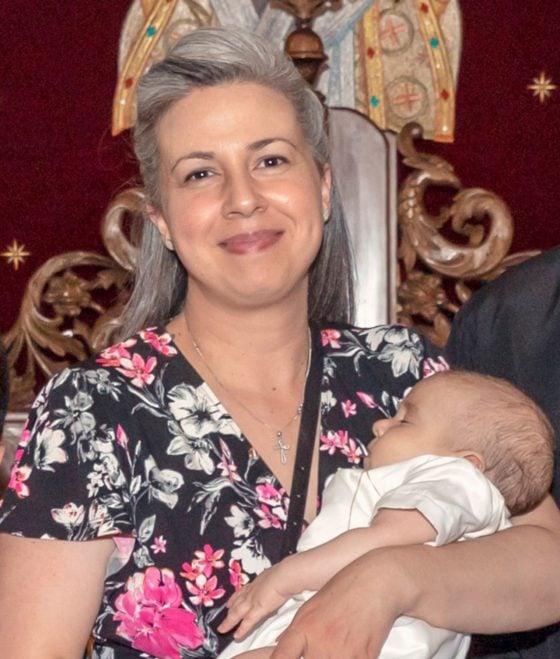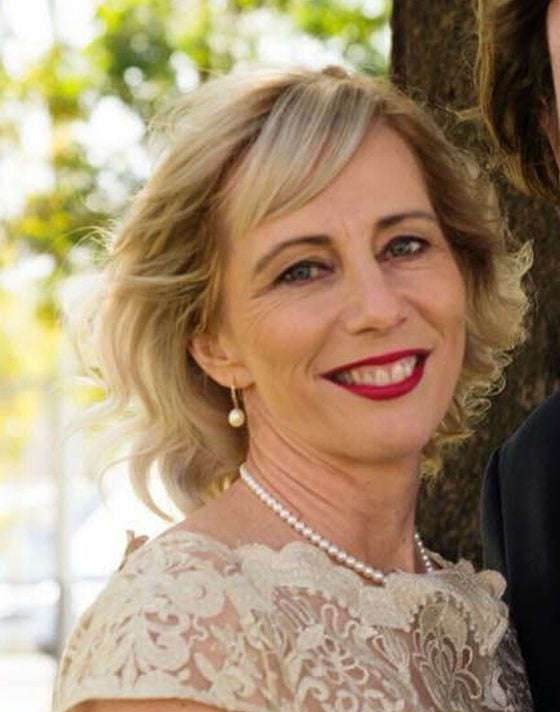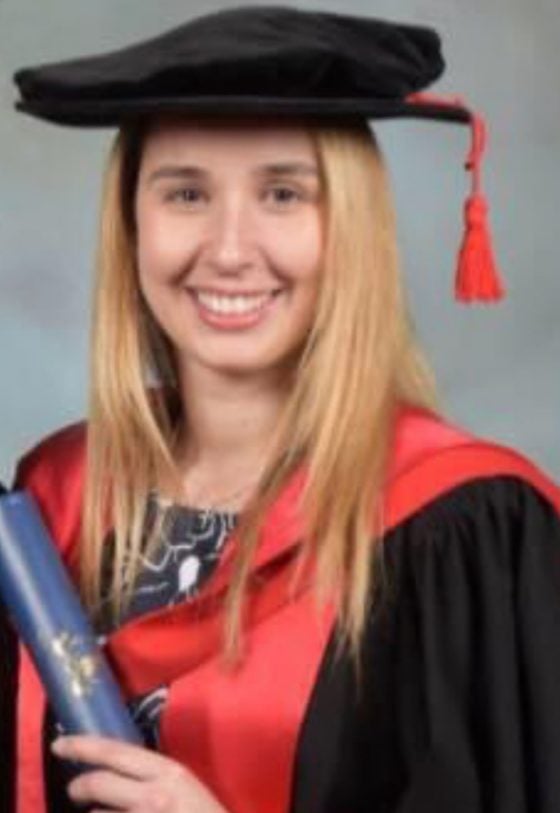Some weeks ago, we spoke to three priests about their journeys to the priesthood. All three were married men and all three had to seek the consent of their wives before becoming priests. Neos Kosmos interviewed their presvyteres to find out what their lives were like as the partners of men dedicated to serving their parishes and their Church.
Presvytera Eleni Nicolau
Eleni Nicolau is the wife of Fr Dimosthenes the parish priest of the Holy Church of Saint Paraskevi, St John the Merciful and Our Mother of Consolation in St Albans, Melbourne for the past 12 years. The couple have four young children ranging in age from 10 years old to eight months.
“I was 22 when I met Fr Demos and he told me on our first date that he wanted to be a priest. I knew he was studying at theological college at the time. I was studying to be a primary school teacher – a role she retained full time in her first year of marriage, but which ended during her pregnancy.

She briefly returned to teaching but found it hard with the children and her other responsibilities. She said she considered returning as a part-time teacher once the children were older.
“Becoming a presvytera was not something I ever planned and did not think I would ever be one,” Ms Nicolau told Neos Kosmos. “Though the thought of being a Presvytera worried me at first, I felt it was something I should do because I had always thought that there were not enough young priests in the church.”
She spoke to her spiritual adviser who said: “Just focus on being a good wife. It is as with any job and you need to support your husband.”
There is no manual on how a priest’s wife is expected to conduct herself, no guidelines on what the role requires.
READ MORE: Answering the call to take up the life of a parish priest
“I saw how strong the older presvyteres were and I did not think I would be good enough for this role,” Ms Nicolau said.
The couple had planned to have children before her husband entered the priesthood but that was not to be.
“Part of me knew that he really needed to be in the priesthood. I could see it when we attended the services that was where he really wanted to be, so I thought: ‘why should we delay it?’”
“I have always received guidance from my spiritual father. I did not do anything differently as presvytera and I did not stop doing anything that I used to. But I was more in the public eye and was more careful not scandalize anyone.
“Senior presvyteres have given me invaluable advice over the years which has helped me tremendously.
“But I have been blessed with no major problems. People have been loving and warm. The parish has become an extension of the family – whatever happens in the parish, you feel it yourself, and you have a brotherly love for each parishioner.
“Many parishioners are very thoughtful and grateful. They recognise the sacrifice of a Presvytera and it is humbling: They acknowledge that the priest sacrifices his time away from his wife and children in order to help people in need. So, when things become difficult, I always remind myself that this is my own meagre offering for God and the life of the church,” Ms Nicolau said.
“It is quite a journey, especially the beginning was very difficult. Both of us are maturing and adjusting. We are accepting this is how it is and I accept that there will be times when he will not be home and I am content with it. There are also many blessings that come with being a Presvytera, and I would not change it for anything in the world.
“the adjustment was hard especially with the children but I have been blessed to have close family to help.

Presvytera Deanne Sullivan
Both Deanne Sullivan and her husband, Fr John are late converts to Orthodoxy. Fr John is the parish priest of St Nicholas Orthodox Church in Bunbury, south of Perth in Western Australia. They have adult children, two sons and a daughter and six grandchildren.
She told Neos Kosmos that Fr John and his second son discovered Orthodoxy together. Their daughter converted soon after Mrs Sullivan was baptized into the church in 2017.
“I am still very new to the role of presvytera. My husband was ordained in October last year.
“There is no duty statement for a presvytera, or a job description. Being a non-Greek can be confronting for some, refreshing for others.
“I have as a friend and mentor a presvytera in Perth, which is about two hours away, and she is in easy contact. She has been a godsend to me,” Ms Sullivan said. “Without her it would be much more difficult.
Up to 30 locals attend services on a regular basis but there is growing interest from beyond Bunbury.
“The interesting thing is that we are getting people coming from Perth services because they are predominately in English and being able to understand what is said helps to draw them to the church.. It is positive and exciting as we can see it growing.
“This is quite a pioneering role in that a non-Greek convert has become an Orthodox priest. One of our visions is to prepare for the next priest to take our church the next step to where it needs to go. We see ourselves as laying the foundations and we have a great responsibility.”
READ MORE: Aussie Fr John’s winding road to the Orthodox church
She said the parish held youth-study group on the basics of Orthodoxy for everyone to understand, whatever their backgrounds.
“People are hungry (for knowledge).”
“We are definitely ‘lynchpin“coordinators’ but we are reaching out to people to help us coordinate and come on board and play a role so that they are not just passengers. We are encouraging the younger ones and people are responsive.
“Our heart is definitely to the wider community but also not push the Greeks aside. Greek will always be part of the service. It’s the youth and young families. Youth events, flourishing Sunday school, healthy parish in our vision.
“It has been the most rewarding journey anyone could ask for. But every journey has its struggles. We look forward to it will not be easy but we are up for it. What we cannot do, God makes possible. If we think we can do it all on our own, then we have missed the point of it all,” Ms Sulllivan said.

Presvytera Rhothanthi Georgiou
Dr Rhothanthi Daglas Georgiou is the wife of Fr Nicholas of the Presentation of Our Lady to the Temple in North Balwyn. The mother of three young children aged three, one and a half years and six months. She is also a research fellow in mental health at the University of Melbourne.
She answered written questions submitted to her.
What did you expect in the life of a presvyteria?
I expected a life for me and my family that is committed to the church and is centred in Christ. I expected that my husband would be busy with not only the needs of his family but with the needs of the many parishioners he ministers to, and this may come at a sacrifice to me and our family.
What help did you receive before taking on the role?
My husband and I had many discussions about this decision. I met other presvyteras and they would talk openly about the joys and challenges of the clergy family life. I also had many talks about it with my spiritual father.
What are your duties in that role with regard to the life of the parish?
Father and I have three children, who are 3yo and under. So, my main role is to take care of the ‘little church’ which is our family, while father is busy caring for and ministering to needs of the Parish. I attend the services with my children, maintain warm and friendly relationships with the members of philoptiho, committee and parishioners, and help out wherever I can, while also being a working mother.
How do you juggle the role of presvytera, mother, wife and academic?
It is a juggle, I’m often balancing all my roles simultaneously, especially during the lockdowns. It takes a lot of patience, prayer, and humility in excepting that life is very busy, therefore perfection is not the goal, but spiritual, physical and mental wellness is.
What are the positives of the role and what are the difficulties?
The positives is that we strive to be close to God in every moment of our day, and when we fail, we pick ourselves up and keep trying. The negatives is that we don’t get to do as many things as we would like to do as a family.
What would be your advice to someone who is about to follow this path that you have taken?
My advice to anyone who is interested in taking on this role is to be yourself and have complete trust in God.









